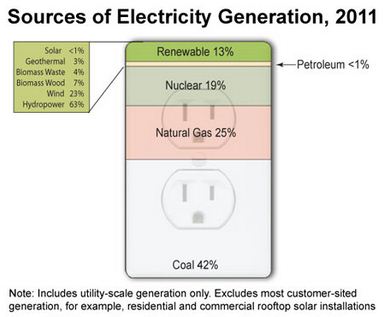Politics Is Digital But People Are Analog
SEARCH BLOG: POLITICS
Now that 2012 is upon us, the reality of the election process for a new president impinges on our thoughts more frequently. Potential voters are called upon to combine their own personal biases with "positions" from various candidates and attempt to make a rational choice in the voting booth in November. It is a choice made more complicated by incomplete information and outright distortions.
Politicians are busy trying to determine the direction toward which the wind is blowing so that they can adjust their proclamations accordingly. The position of the day becomes fodder for charges of "flip-flopping." Last year [or five years ago], so-and-so had a progressive rating of 7.9 out of 10 for this and now he is 3.2. That means he has either learned his lesson or become disgustingly weak, depending on which bias against which the position is scored. 53.7% of voters favor such-and-such, up from 42.1% just a year ago. We need [want] digital precision in our politics.
If we examine our daily personal lives, we can see how our thoughts our more analog... less precise. We are more ... or less ... inclined about various issues, feelings, needs, etc. from day to day. We are often ambivalent about something: we pity the plight of the poor family whose story has just been broadcast and wonder why they aren't being helped more, but we view lack of personal economic success as a failure of personal initiative. In similar ambivalent thinking, some believe more taxes are necessary... just not from themselves. This ambivalence reflects the analog nature of life... nothing is quite exact or precise... nothing is static.
What we get is more: more laws, regulations, directives, contradiction, waste, dislocation, and distortion. In an attempt to standardize the nation, we trample the variation that makes the nation prosper and function effectively... often in the name of that variation or diversity. No, that doesn't mean there should not be standards. We don't want 300 different voltages being distributed along the electric grid. But neither do we want a central government telling us what we must have in our diets or what level of health care is allowable. Our national size forces us to accept some commonality, but it does not force us to accept that our personal rights must be trampled to protect someone else's personal rights. It also doesn't mean that the government should pick winners and losers... something best left to the marketplace and millions of dynamic, self-interested decisions.
As citizens and voters, we will be faced with a "1 or 0" choice ... yes or no ... purely digital ... in November. It will satisfy us for the moment and then we will begin the process of four more years of analog feelings about the results... more or less. We will try to defend our reasoning with digital arguments, but the reality is analog... and that is why political reality is so confounding to most of us. We must remember that the candidates for president are analog beings with analog contradictions ... despite the digital positions they may publicly state. None of them is capable of being 1 or 0 on everything.
They will be more or less... and they will be more or less appealing depending on your personal biases.
That's not to say that the nature of politics is unnatural, but nature is analog after all. Where are, for example, these politicians along your analog gauge?






